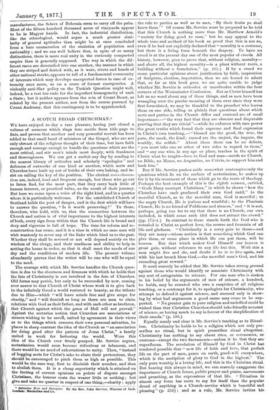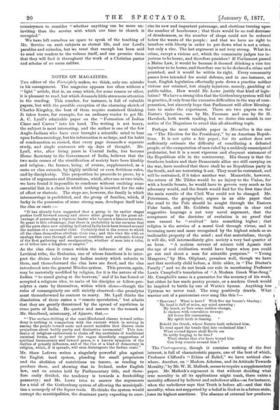A SCOTCH BROAD CHIJRCHMAN.*
WE have enjoyed to-day a rare pleasure, having just closed a volume of sermons which rings true mettle from title-page to finis, and proves that another and very powerful recruit has been added to that small band of ministers of the Gospel, who are not only abreast of the religious thought of their time, but have faith enough and courage enough to handle the questions which are the most critical, and stir men's minds most deeply, with frankness and thoroughness. We can get a surfeit any day by sending to the nearest library of orthodox and scholarly "apologies" and defences of outworks of one kind or another, which sects and Churches have built up out of bricks of their own baking, and in- sist on calling the key of the position. The clerical voces clanzan- tium are, indeed, loud and frequent enough, but those who go out to listen find, for the most part, that they carry back little of human interest, or practical value, as the result of their journey. But here we come upon a voice of the right kind, and in a quarter where it is particularly welcome. For the established Church of Scotland holds the post of danger, and is the first which will have to answer the question, "Is it worth preserving?" To those, therefore, who hold, with us, that the connection between the Church and nation is of vital importance to the highest interests of both, every sign from within that the Church life is broad and deep and vigorous is full of hope. The time for reform and re- construction has come, and it is a time in which no sane man will wish wantonly to sever any of the links which bind us to the past. Whether they shall be severed or not will depend mainly on the wisdom of the clergy, and their readiness and ability to help in setting the house in order, so that it shall meet the needs of our day and the conditions of modern life. The present volume abundantly proves that the writer will be one who will be equal to the need.
The courage with which Mr. Service handles the Church ques- tion is due to the clearness and firmness with which he holds that the fate of Christianity is not involved in the fate of Churches. Old forms may perish, but only to be succeeded by new, coming ever nearer to that Church of Christ whose work is to give back to the infinitely Good a world restored to beauty, as the tribute due to Him—which "will leave minds free and give scope for charity," and "will flourish as long as there are men to claim relations with God as their father, and with each other as brethren, that Church against which the gates of Hell will not prevail." Against the sectarian notion that Churches are associations of sinners wishing to be saved, united by agreement in their views as to the things which concern their own personal salvation, he 'places in sharp contrast the idea of the Church as "an association for doing good after the pattern of Jesus Christ," a family
united in work for bettering the world. Were this idea of the Church ever firmly grasped, Mr. Service argues, sectarianism would soon become ridiculous or infamous, and there would be no need of exhortations to unity. Then, "instead of begging sects for Christ's sake to abate their pretensions, they should be encouraged to pitch them as high as possible. This would be the sure way, first to diminish their number, and then to abolish them. It is a cheap superiority which is attained on the footing of correct opinions on points of dispute amongst Christians, the honour costa the wearer little or nothing ; but give and take no quarter in respect of one thing,—charity ; apply
• Satrestion Here and Hereafter. By the Bev. John Service, Minister of Inch. Landow Meamiltur aad Co.
the rule to parties as well as to men, By their fruits ye shall know them." Of course Mr. Service must be prepared to be told that this Church is nothing more than Mr. Matthew Arnold's "society for doing good to man," but he may appeal to the whole tone and method of his book as proof that this is not so, even if he had not explicitly declared that "morality is a costume, but there is a living form beneath the drapery. To have no creed is at the present day one of the most popular of creeds. All history, however, goes to prove that, without religion, morality— and above all, the highest morality—is a plant without roots, a building without a foundation." (p. 215.) If by a creed we mean particular opinions about justification by faith, inspiration of Scripture, election, imputation, then we are bound to admit that, so far as this book goes, we are quite unable to judge whether Mr. Service is orthodox or unorthodox within the four corners of the Westminster Confession. But as Christ himself has left us no word about any of these things, and as men have been wrangling over the precise meaning of them ever since they were first formulated, we may be thankful to the preacher who leaves them on one side, telling us plainly that questions about which sects and parties in the Church differ and contend are of small importance—" the very fact that they are obscure and disputable proving that they are trivial "—while he enforces with rare power the great truths which found their supreme and final expression in Christ's own teaching," blessed are the good, the true, the pure, the meek, the kind; cursed are the unjust, the impure, the worldly, the selfish." About these there can be no debate, "you must take one or other of two sides in regard to them," and "any one who, in any age or place, teaches in the spirit of Christ what he taught—love to God and man—needs no Church, no Bible, no Moses, no Augustine, no Calvin, to support him and back him."
But if Mr. Service pushes aside somewhat contemptuously the questions which lie on the surface of sectarianism, he makes up for it by his treatment of those which go to the roots of theology. Perhaps the best example of this is the eighth sermon, entitled, "Gods Many amongst Christians," in which he shows "how the Churches have each produced their own God until," to the merciful Church, as to the merciful man, God is merciful ; to the angry Church, He is jealous and wrathful ; to the Pharisaic Church, He is no friend of Publicans and sinners," and "it is not, perhaps, going too far to say that there is no Church, our own included, in which some such idol does not attract the crowd." (pp. 172-4.) In contrast to these stands forth the God who is revealed in Christ as perfect love, the source and fountain of all life and gladness. "Christianity is a sorry gain to those—and they are many—whose notion is that something which God can give them, or some place in which He can put them, will be heaven. But that which makes- God Himself our heaven is great gain, without reference to any life but this. With this a man might live and die, and doubt if he is to live again, and with his last breath bless God,—the merciful man's God, and his- exceeding great reward."
It need scarcely be added that Mr. Service takes strong ground against those who would identify or associate Christianity with any sort of antagonism to science. For one man who is shaken in his belief by the arguments of men of science, a hundred, he holds, may be counted who owe a suspicion of all religious teaching, or a contempt for it, to apologists for Christianity, who attempt to defend it against science, and succeed only in show- ing by what bad arguments a good cause may come to be sup- ported. "No greater gain to pure religion and undefiled could be wished than that Christian Churches should take friendly account of science, as having much to say in favour of the simplification or their creeds." (p. 196.)
Equally manly and clear is Mr. Service's teaching as to Ritual- ism. Christianity he holds to be a religion which not only pre- scribes no ritual, but in spirit proscribes ritual altogether. Christianity has nothing to say about rites, or ceremonies, or customs—except the two Sacraments—unless it be that they are superfluous. The revelation of Himself by God in Christ has. rendered possible that "new life of faith and love, that perfect life on the part of men, peace on earth, good-will everywhere, which is the ascription of glory to God in the highest." The only pure worship is a loving life, and this is the Christian ritual. But bearing this always in mind, we can scarcely exaggerate the importance of Church forms, public prayer and praise, sacraments and preaching, as the expressions of that life. "Ritualism in almost any form has more to say for itself than the popular dread of anything in a Church-service which is beautiful and pleasing" (p. 252) ; and as a rule, Mr. Service invites his
countrymen to consider "whether anything can be more un- inviting than the service with which our time in church is occupied."
We have left ourselves no space to speak of the teaching of Mr. Service on such subjects as eternal life, and our Lord's parables and miracles, but we trust that enough has been said to send our readers to the volume itself, and can promise them that they will find it throughout the work of a Christian pastor and scholar of no mean calibre.










































 Previous page
Previous page